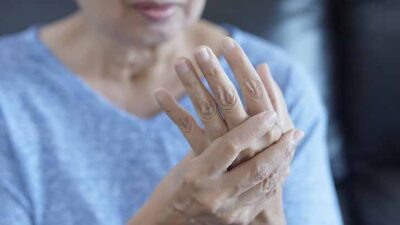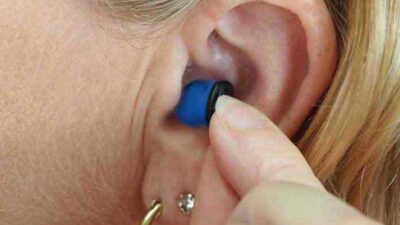Carpal tunnel syndrome is a common disorder of the peripheral nerves. The disorder affects the median nerves found in the wrist which leads to pain, numbness, weakness, and other similar symptoms in the hands.
Carpal tunnel syndrome (CTS) is a result of surrounding tissue pressuring the median nerve.
If treated early on, the condition is reversible, but if left untreated, CTS may lead to permanent nerve damage and muscle atrophy which can significantly impact one’s ability to function.
About Carpal Tunnel and Peripheral Nerves
The carpal tunnel is a compartment in the wrist through which the median nerve travels. The median nerve is responsible for sensation in the palm side of the thumb, index, middle, and ring fingers but interestingly not the little finger.
If you are experiencing uncomfortable symptoms that are affecting the first four fingers of your hand but not your little finger, you are likely suffering from CTS. The median nerve also causes sensation in the flexor tendons and provides muscle functioning.
Swelling in the wrist due to medical conditions or excessive strain can put pressure on the median nerve and lead to discomfort in the form of pain, numbness, and tingling. If left untreated, swelling and pressure can cause permanent damage to both the nerve and surrounding tendons.
For this reason, it is important to seek treatment as soon as you develop discomfort in your hands.
What the Statistics Say
An estimate one million U.S. adults require medical treatment for CTS each year. It most commonly affects middle-aged women with a peak incidence between 55 and 60 years of age.
While CTS commonly believed to be caused by repetitive movements at work, researchers believe that underlying health conditions such as arthritis and diabetes are more likely to lead to the onset of CTS.
While repetitive hand movements may not lead to CTS, epidemiological studies do show a higher incidence of CTS in workers in occupations requiring repetitive movement. For instance, cashiers, grinders, aircraft engineers, car seat sewers are found to be those at highest risk of taking sick leave due to CTS.
However, occupation alone does not lead to the development of CTS according to one study. The study at hand compared workers with and without CTS and found that workers with CTS had a 19% greater lifetime tobacco use, a 5% greater use of caffeine and 75% greater use of alcohol than those without CTS.
Why Pressure Leads to CTS
The exact mechanisms behind the development of CTS remain unclear. One theory is that chronic pressure on the median nerve in cases of CTS cause less blood supply to the median nerve which leads to pain and in severe cases, permanent muscle and nerve damage.
Furthermore, when surgery is performed to relieve pressure within the carpal tunnel, doctors frequently observed normalized blood flow within one minute after the release of the carpal ligament further suggesting that impaired blood flow to the median nerve is responsible for the symptoms of CTS.
Treatment for CTS
There are two types of treatment for CTS – surgical and non-surgical. Those with mild to moderate symptoms usually don’t require surgery. Instead, doctors will recommend hand braces, wrist splints, ultrasonic therapy, local corticosteroid injections, oral steroids, pain relievers, yoga therapy, vitamin supplements, etc. to reduce pressure on the median nerve.
Pregnant women who are also a high-risk group for CTS usually don’t require invasive treatments as well because symptoms usually resolve on their own shortly after delivery. On the other hand, severe cases of CTS with symptoms of muscle atrophy, surgery is required to release pressure on the median nerves by cutting the transverse carpal ligament.
Surgery helps remove pain and numbness caused by CTS but when muscle weakness has already developed, chances of improved muscle functioning are low.
Consequences of Untreated CTS
According to Sanjeev Kakar, M.D. at Orthopedic Surgery, Mayo Clinic, Rochester, Minn., progression of CTS can cause worsening of the symptoms and even loss of finger coordination and functioning.
Fingers may become weak and simple tasks such as buttoning your shirt may become difficult.
Such symptoms can cause great problems if your work requires good hand flexibility and coordination which may lead to loss of work days and even early retirement.
For this reason, it is important to address any uncomfortable sensations in your hands early on to prevent complications caused by CTS.
Conclusion
While CTS is not a life-threatening illness, the symptoms associated with this fairly common disorder can greatly affect every day functioning. The disorder which is commonly found in middle-aged persons and the female sex, was previously believed to be a result of repetitive and awkward movement of the hands.
However, epidemiological and other studies found that underlying health conditions and lifestyle factors play a large role in the development of CTS. Luckily, when treated early on, CTS is likely to completely resolve.







 This article changed my life!
This article changed my life! This article was informative.
This article was informative. I have a medical question.
I have a medical question.
 This article contains incorrect information.
This article contains incorrect information. This article doesn’t have the information I’m looking for.
This article doesn’t have the information I’m looking for.